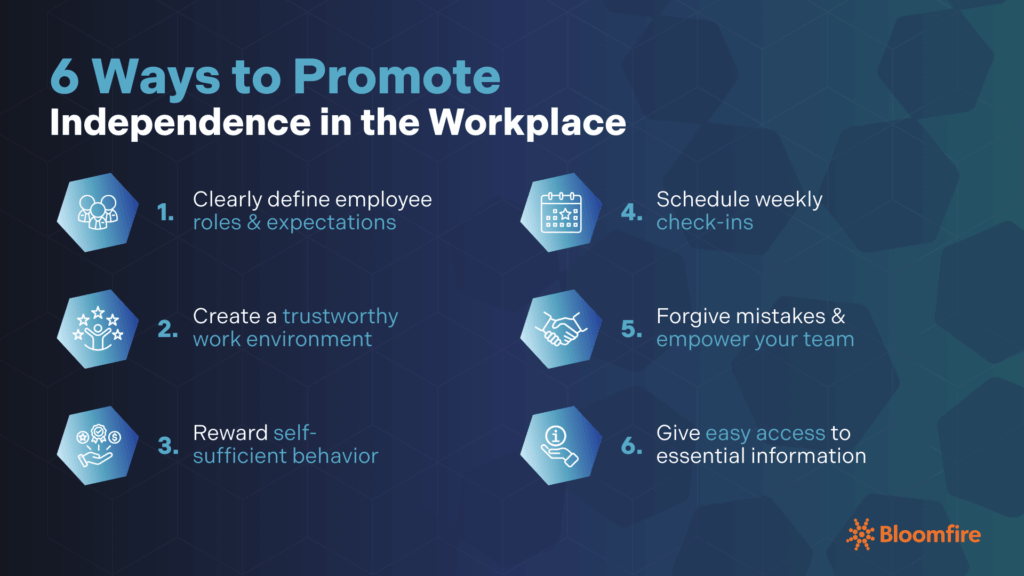How to Encourage Your Team to be Self-Sufficient at Work

Imagine a workday where you must spend your morning completing a project before the end of the day. But before you even begin your project, an employee asks for assistance in acquiring information. You spend time searching for the information, send them the needed knowledge, and finally start digging into your project. But to your surprise, these requests for help persist throughout the day, preventing you from being productive.
If this problem sounds familiar, you’re not alone.
A lack of self-sufficient employees is becoming more common in the workplace, which can cause a reduction in productivity and frustration with other colleagues. Luckily, there are different solutions to encourage employees to be self-sufficient at work, which will boost productivity in the workplace.
6 Ways to Promote Independence in the Workplace
To encourage your team to be self-sufficient at work, it’s essential to create an environment that empowers employees to work confidently and independently. By clearly defining employee roles, fostering trust, and providing access to resources, you can encourage self-sufficiency and reduce dependency on management. The following six actionable steps will help your team thrive in a more productive and positive work environment.

1. Clearly Define Employee Roles and Expectations
During your next onboarding meeting with new hires, clearly and carefully explain their roles and expectations in your company. By defining performance expectations for your employees, they will understand how to be self-sufficient at work and won’t depend on you for daily assistance.
According to Ben Wigert, regarding management expectations, “Only 47% of employees strongly agree they know what is expected of them at work.” If your team doesn’t know what is required of them, they are more likely to seek feedback on every decision they make, even if the decision doesn’t require any.
If you implement effective training and onboarding programs in your company, employees will be more knowledgeable in their roles and expectations in your company. Sam Schneider recommends surveying employees and using a knowledge platform to help your team better understand their roles in the company. This, in turn, will make your employees less dependent on you and more self-sufficient.
2. Create a Trustworthy and Positive Work Environment
Demonstrating trust in your employees’ ability to work independently is crucial to their success in self-sufficient tasks. By cultivating a positive work environment built on mutual trust, you can boost overall employee satisfaction, motivating your team to work harder and perform more effectively on their own.
When building a trustworthy relationship with your team, it’s vital that you don’t micromanage their every move, as this will indicate to them that you should approve of their every move at work. Instead, let your employees work independently without your supervision so that they can make decisions on their own without your guidance or judgment.
With a trusting team, you also want to foster a positive atmosphere in your company, so your staff feels comfortable in their self-sufficient work. A study on factors to increase self-sufficiency found that characteristics of a positive work environment, like team support and effective communication, help build self-sufficiency in employees. So, creating a trustworthy, positive work environment is essential to self-sufficiency at work.
3. Reward Self-Sufficient Behavior
Rewarding your employees for being self-sufficient at work will encourage them to continue that behavior and motivate new employees to be self-sufficient. These rewards can be actual rewards like gift cards, or something meaningful like publicly acknowledging someone’s achievements.
Rewarding employees for their self-sufficiency will motivate them to continue working independently. These rewards can be personalized for individual employees, as some might prefer bonuses while others might prefer a gift card. People don’t mind being rewarded for their hard work, and will want to continue their self-sufficiency for further reward.
Rewards don’t have to cost the company money either, as public acknowledgment for an employee’s success can be another great way to encourage self-sufficiency in the workplace. When your employee succeeds in a project they work on independently, mention their success in your next meeting. When you highlight their accomplishments, they will want to continue doing good work for you.
4. Schedule Weekly Check-Ins
If you meet regularly with your employees, you can prevent random interruptions about insignificant decisions. Setting a weekly check-in with your staff will ensure they know when to seek feedback, encouraging more self-sufficiency at work.
Gallup’s 2019 research found that employees are “5.2x more likely to strongly agree that they receive meaningful feedback” during weekly check-ins. Encourage employees to use these weekly scheduled meetings to bring up all non-urgent issues, as it will prevent them from consistently reaching out with unnecessary concerns, and the feedback can be much more meaningful.
When you implement weekly meetings with your team to bring up their concerns, they will have more time to address them on their own while receiving meaningful feedback once they’ve given it their best. Your employees will be more self-sufficient at work, increasing productivity as they actively try to solve their problems instead of waiting for you to help them.
5. Forgive Mistakes, and Empower Your Team
It’s important to forgive mistakes when they happen and empower your team to overcome said errors so they can succeed in your company. If your employees are uncomfortable making mistakes, they’ll be tempted to shift their responsibility to you by asking you to make decisions for them.
Empowering employees to learn from their mistakes enables them to tackle future missteps confidently. When an employee owns up to an error they’ve made, it’s essential that you don’t respond in anger, but with forgiveness. To correct the course for the future, focus on solutions rather than blame.
By forgiving your employees for their mistakes, they will feel more psychologically safe in your company. This psychological safety empowers your team to confidently communicate and work better independently.
6. Give Access to the Information Needed for Success
Sometimes, employees are dependent on their manager simply because they don’t know how, who, or where the information they need is located. If your company, like many others, suffers from information silos, employees may have to go through many loopholes to get answers to their questions. They would inevitably be forced to come to you seeking the information, some of which you might not even know about.
By investing in a knowledge sharing solution like Bloomfire, you can quickly eliminate information silos and employee dependency. Knowledge management platforms let employees electronically store, share, and access necessary documentation, as well as ask and answer questions across various departments.
When employees can search for information in a knowledge management system before going to their manager, they will be able to seek the information out for themselves before coming to you. In turn, you will have a more self-sufficient employee, as they can easily search for the information they are looking for without having to come to you.
Frequently Asked Questions
What does it mean to work independently?
Working independently means taking personal responsibility for your actions and decisions within your work, without needing constant supervision from others. Independent employees are reliable and self-motivated, as they’re able to solve problems on their own and make decisions autonomously.
How would you describe an employee who is self-sufficient at work?
A self-sufficient employee makes more self-guided decisions and works independently. With this independence, employees tend to be more creative, motivated, and knowledgeable in their field of work.
What are the advantages of employees working independently?
Employees will have better problem-solving skills since they find solutions on their own. They are also more efficient because they are self-guided in their work, without any distractions. Most importantly, your employees will be more satisfied with their jobs because they are able to manage their own responsibilities and creativity.
Our Takeaway of Working Independently
When you encourage employees to be self-sufficient at work, your team will be able to thrive in a more productive, positive, and efficient work environment. There are many examples of promoting independence: scheduling weekly check-ins, clearly communicating expectations and values, and empowering your team. This self-sufficiency at work will help your employees succeed in your company and become happier working for you.
By using a purpose-built knowledge management platform like Bloomfire, all the information employees need and the questions they have will be available to them in one place. Take the first step towards transforming your company by equipping your team with the tools they need to thrive independently.
Empower Employees to be Self-Sufficient
Unlock your team’s self-sufficiency with Bloomfire’s knowledge management platform.
Learn More

10 Best Knowledge Management Practices in 2026

Different Types of Knowledge: Implicit, Tacit, and Explicit

Striking the Right Balance Between AI and Human Customer Service

Estimate the Value of Your Knowledge Assets
Use this calculator to see how enterprise intelligence can impact your bottom line. Choose areas of focus, and see tailored calculations that will give you a tangible ROI.

Take a self guided Tour
See Bloomfire in action across several potential configurations. Imagine the potential of your team when they stop searching and start finding critical knowledge.